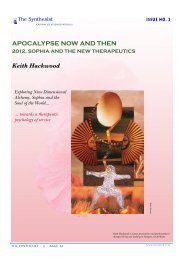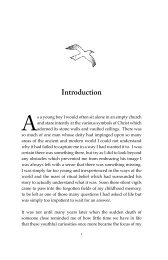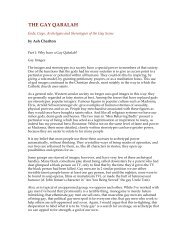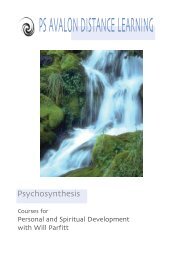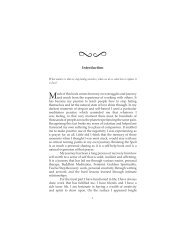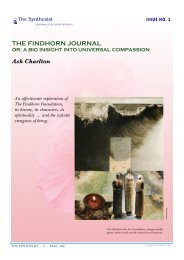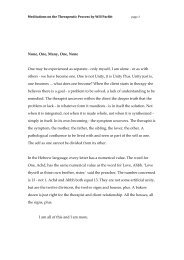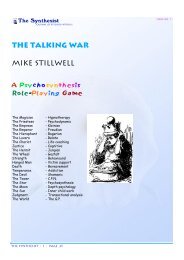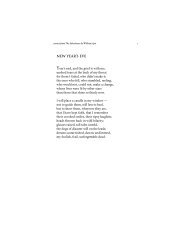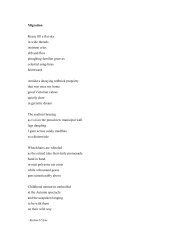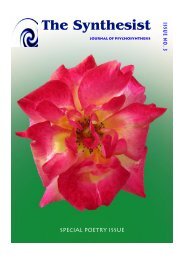Kabbalah for Life by Will Parfitt
Kabbalah for Life by Will Parfitt
Kabbalah for Life by Will Parfitt
Create successful ePaper yourself
Turn your PDF publications into a flip-book with our unique Google optimized e-Paper software.
<strong>Kabbalah</strong> <strong>for</strong> <strong>Life</strong> <strong>by</strong> <strong>Will</strong> <strong>Parfitt</strong><br />
2 extracts<br />
from Chapter 8 • ANGELS, DEMONS, SEXUALITY AND SHEKHINAH<br />
“Behold, the human has become as one of us, and now may put <strong>for</strong>th a hand, and take of the<br />
Tree of <strong>Life</strong>, and eat, and live <strong>for</strong> ever.” Book of Genesis (adapted from Chapter 3 Verse 22)<br />
Kabbalistic magic has been described as the mysticism or yoga of the West. Whilst<br />
there are similarities, and the ultimate aim of complete self-realisation is the same,<br />
the major distinction is that <strong>Kabbalah</strong> focuses on coming to earth rather than<br />
transcending it. <strong>Kabbalah</strong> stresses that the world just as it is, although it may<br />
sometimes appear impure or valueless, is our most precious tool <strong>for</strong> trans<strong>for</strong>mation.<br />
You do not have to go somewhere else to attain self-realisation; instead you can<br />
uncover its abiding presence in the apparently mundane. Magic, in the Kabbalistic<br />
sense, is found within one’s life as it is, in both its heights and its depths.<br />
The philosophy of Kabbalistic magic says that the two most important powers in the<br />
human psyche are will and imagination, both properly tempered <strong>by</strong> the greatest<br />
cosmic <strong>for</strong>ce, love. Imagination is what we use to create the world in which we live,<br />
and will is the <strong>for</strong>ce <strong>by</strong> which we create it. In bringing these two <strong>for</strong>ces together, a<br />
Kabbalist may affect events both in their immediate surroundings and beyond.<br />
Whilst some Kabbalists, especially those of a mystical nature, sometimes deride<br />
Kabbalistic magic as being too involved with the use of power, all methods <strong>for</strong><br />
trans<strong>for</strong>ming oneself and the world, whether considered spiritual, mystical or<br />
mundane, that change your inner reality and outer behaviour, may be considered<br />
valid approaches to self-realization.<br />
A medieval treatise called ‘The Magic of Abra Melin the Mage’ is based around the<br />
notion that to have ‘knowledge and conversation of your guardian angel’ (which will<br />
be explored further later in the chapter), the equivalent to ‘illumination’, it is<br />
essential to first go into your depths, to face ‘the demons of darkness’, and bring<br />
them under your control. From a Kabbalistic perspective, we come to understand<br />
and experience that the light of Kether can be found shining in the darkest places<br />
and, when found, its light, brighter <strong>for</strong> being experienced in the darkness, may<br />
illuminate us.<br />
The simplest definition of magic is that it is a way of making happen what you want<br />
to happen, using imagination (the intervention of spiritual beings) and will (the<br />
occult controlling principle.) In his book ‘The Tree of <strong>Life</strong>’, Israel Regardie,<br />
accomplished magician and authority on ceremonial magic, says that through<br />
imagination ‘we are capable of being united to the gods, of transcending the<br />
mundane order, and of participating in eternal life. Through this principle, there<strong>for</strong>e,<br />
we are able to liberate ourselves from fate.’ Regardie goes on to reflect that ‘it is a<br />
great mistake to consider imagination to be the same as fantasy and daydreaming.<br />
Imagination is the image-making faculty, an image creating power which when<br />
developed may prove of the utmost importance as assisting the soul in its <strong>for</strong>ward<br />
journey.’ What distinguishes magical imagination from daydreaming is that the<br />
imagination is being directed <strong>by</strong> the will. In ‘The Secret Doctrine’, Helena Blavatsky,<br />
founder of the Theosophical Society, writes of imagination that it is ‘the mysterious<br />
power of thought which enables it to produce external, perceptible, phenomenal<br />
results <strong>by</strong> its own inherent energy,’ this energy is the will in action. Indeed, the act<br />
of will is a natural process, the very spark of life itself, and every choice or decision<br />
we make is an act of will.<br />
The definition of magic most widely used in esoteric books is from Aleister Crowley<br />
who defines it as ‘the science and art of causing change to occur in con<strong>for</strong>mity with
your will’, which is another description of making happen what you want to happen.<br />
Of course to make magic work can be a complex task. To make happen what you<br />
want to happen, many different circumstances and conditions need to be taken into<br />
account. If what you want is, <strong>for</strong> instance, a bar of chocolate, you have to decide on<br />
the degree and kind of <strong>for</strong>ce to use; the shop is only a short distance away so you<br />
may decide upon walking as the kind of <strong>for</strong>ce, <strong>for</strong>ward at approximately four miles<br />
per hour as the degree. You have to exert this <strong>for</strong>ce in the correct manner and<br />
through the correct medium – it would be no use walking in the wrong direction and<br />
up the garden path. This decided upon, you only have to apply your <strong>for</strong>ce to the<br />
correct spirit or agent – the shopkeeper – using a magical link, in this case money,<br />
and you have succeeded in your magic as you now have a chocolate bar to eat.<br />
In this example, the spirit you have involved in your magic is a shopkeeper, the best<br />
kind of ‘spirit’ to invoke when you want to purchase something. You might not know<br />
exactly what they are or why they exist at all, but you can experience the presence<br />
of ‘spirits.’ Despite there being many different ideas and opinions about what the<br />
spirit world is, or whether it even really exists or not, the shared experience of<br />
magicians and shamans of all persuasions is that alongside our everyday reality<br />
there is a realm (or realms) of spirits populated <strong>by</strong> innumerable different types of<br />
entities. These range from the powerful to the weak, from the bright to the dimwitted,<br />
from benevolent through cheeky to downright malicious.<br />
A Kabbalistic magician’s power to communicate with a spirit, in either their world or<br />
ours, depends upon knowing the names, strengths, weaknesses, and<br />
correspondences to the spirit in question. This knowledge enables you to call or<br />
dismiss spirits, and compel them to per<strong>for</strong>m tasks <strong>for</strong> you. Thus in the example of<br />
summoning up a shopkeeper to acquire a bar of chocolate, your knowledge that a<br />
shopkeeper spirit will exchange a bar of chocolate <strong>for</strong> money enables you to<br />
communicate with the spirit and make your magic work. Learning the most<br />
appropriate means to communicate with a spirit is equally valid on the spirit plane<br />
as in our mundane realm, perhaps more so<br />
.<br />
Magic is generally more oriented towards using the will rather than not and thus<br />
concentrates on developing our ability to choose. Some Eastern approaches to selfrealisation<br />
suggest that it is better to simply accept things as they are and surrender<br />
to the unfolding nature of life. A Kabbalist will certainly choose to do just that at<br />
times, to let things be, wait and see what unfolds. The point is, however, that the<br />
magician has a choice in the matter, whether to act or not, and that is what defines<br />
magic as the ability to choose. The nineteenth century Kabbalist, Eliphas Levi,<br />
defining magic as ‘the traditional science concerning the secrets of nature<br />
transmitted to us from the magicians of the past’ is affirming that magic is a<br />
tradition, a science, natural and transmittable. Indeed, there is nothing unnatural<br />
about magic, as making happen what you want to happen is a basic human desire.<br />
The real point of magic <strong>for</strong> a Kabbalist is to be able to shift your attention (or<br />
consciousness) beyond your everyday and ego-led limitations, to discover ways to<br />
make the right things happen <strong>for</strong> you, then to put this into practice. However strong<br />
your will may be, unless a link is made between the <strong>for</strong>ce of your will and the<br />
proposed object or condition to be changed, all attempts to make the required<br />
change will fail. However much you want to catch a fish, and even if the fish may<br />
want to be caught, unless there is a rod and line you can both go on wishing (and<br />
fishing!) <strong>for</strong>ever without success.<br />
The magical link may be classified into three main groups depending upon<br />
whether it involves (a) one plane and one person, (b) one plane and two or more<br />
persons, or (c) two planes. Group (a) involves changes brought about <strong>by</strong> a person to<br />
him- or her-self. The instrument of the link already exists, there<strong>for</strong>e, in that all<br />
which happens is inside the magician. The necessary condition to make the link<br />
work is to inflame or elevate your will to the proper pitch so that your intent is put<br />
into action. Of course the magic must still be in line with the greater nature of which<br />
we are all part. However strong your will may be, in the case of organic disease <strong>for</strong>
instance, your apparatus may be damaged beyond the art of nature to repair. It may<br />
be necessary in such a case to assist the internal ‘spirits’ through the ‘purification’<br />
of medicine, the ‘banishing’ of diet, or some other extraneous means.<br />
Group (b) includes all magical operations where the aim is to make happen what<br />
you want to happen upon objects or characters outside of your own inner control.<br />
The inner energy or will to make this happen still needs to be inflamed but now has<br />
to be externally expressed and imposed. For instance, should you wish to overthrow<br />
the leader of a nation, you might initially use words, as in speeches arousing<br />
feelings of discontent with the current leader. If all else failed, you might make the<br />
link <strong>by</strong> hiring the necessary assassin! But, of course (apart from all moral<br />
considerations) an assassin would not be suitable to deal with, say, your opponents<br />
in a local <strong>by</strong>-election. The strength of the agent used <strong>for</strong> the link has to be just right;<br />
too much <strong>for</strong>ce can be as useless as too little.<br />
The third group of magical links that involve two planes require a high<br />
degree of initiation and mystical understanding <strong>for</strong>, as Crowley put it; “we see …<br />
that we can never affect anything outside ourselves save only as it is also within us.<br />
Whatever I do to another, I also do to myself.” For someone with the reputation of<br />
being a ‘black magician’ these words, perhaps surprisingly, convey a true<br />
understanding of the ethics <strong>by</strong> which a Kabbalistic magician will live.<br />
Kabbalistic magicians sometimes use grimoires and spells to make their magic<br />
work, again acts that may sometimes be associated with magic of a less ethical<br />
nature than we we suggesting here, so it makes sense to check out what we mean<br />
<strong>by</strong> these words first. Grimoire is the name some magicians give to their book of<br />
spells. In the Disney movie ‘Fantasia’, the big old dusty tome that the sorcerer’s<br />
apprentice opens to find a spell to use <strong>for</strong> cleaning is a Grimoire. The fact that the<br />
spell takes the apprentice over and he loses control of the operation is a good<br />
warning about not using magical spells until you feel really able to deal with the<br />
consequences. As a Grimoire is the place that a magician puts spells into, we could<br />
compare it to the ‘grammar’ of which ‘spelling’ is a part.<br />
To create spells, a magician may use special magical tools which have a<br />
deeper inner purpose and significance than is sometimes apparent and which are<br />
intended to remind the magician of the deeper purpose of the work. For instance,<br />
sometimes a magician hangs a lamp above the altar to represent the light of pure<br />
soul, and to act as a reminder not to be too confident or clever, that some things are<br />
always unknown and beyond the understanding of even a magician. This lamp may<br />
be on the physical plane or in the imagination of the magician. A modern magician<br />
may also, <strong>for</strong> instance, use a clock or watch as a reminder of the passage of time,<br />
and as a timely reminder of the impermanence of all things.<br />
So a Grimoire is somewhere <strong>for</strong> a Kabbalistic magician to put their spells. The use of<br />
such spells depends on what the Kabbalist wants, how much they want it, and what<br />
they’re willing to put into getting it. If you spell it correctly, what you want to make<br />
happen and the methods <strong>for</strong> achieving this will become clearer to you. Finding the<br />
right spelling of things isn’t so easy, though. The spelling of ‘things’ <strong>for</strong> instance isn’t<br />
what you see in the printed letters ‘t-h-i-n-g-s’ but what the word conjures up in<br />
your awareness. A dog is most definitely not what you see in the letters ‘d-o-g’ and,<br />
more than that, may represent many different connections and associations <strong>for</strong><br />
different people (and of course different associations <strong>for</strong> the same person.)<br />
Good magical practice is to make a spell, set the magic in motion, and then let it go<br />
and not worry whether the spell has worked or not. In other words, the best way to<br />
make a spell work is to <strong>for</strong>get all about it. The spell will only work, though, if you<br />
concentrate your intent strongly enough be<strong>for</strong>e you <strong>for</strong>get it. The notion is that <strong>by</strong><br />
consciously <strong>for</strong>getting your spell, it will be more active in the unconscious and<br />
there<strong>for</strong>e stir up enough energy to make it happen. This does work, the only issue<br />
being that you cannot control when the spell will actually come into operation. Of
course this is also not a problem because it means you have to trust to nature,<br />
which is always the best magic.<br />
Carlos Castaneda suggests that the best way to activate your intent is to speak it<br />
out loud. This is true, the only problem being that you must have stored enough<br />
personal power to be able to voice your spell clearly enough. You collect personal<br />
power every time you act from your centre of intent (paradoxically, whether the<br />
specific intent comes to fruition or not.) This suggests, there<strong>for</strong>e, that the old saying<br />
‘practice makes perfect’ is magically correct. It is worth remembering that spells<br />
work best when the magician is not attached to the desired outcome, a somewhat<br />
strange and yet basic paradox at the heart of magic.<br />
From Chapter 7: Kabbalistic Healing<br />
The Path of the Nose and Mouth<br />
The 14th path connects Chockmah to Binah. Be<strong>for</strong>e continuing, consider what you<br />
understand about Chockmah and Binah.<br />
The 14th Path is known as the illuminating path. Illuminating is the action from the<br />
verb to illuminate. Some extracts from the Ox<strong>for</strong>d English Dictionary may help you<br />
understand what is meant <strong>by</strong> illumination:<br />
1. To light up, give light to<br />
2. To give light to, or remove blindness from (the eyes), esp. fig. in religious sense.<br />
3. To shed spiritual light upon; to enlighten spiritually<br />
4. To enlighten intellectually; to give understanding to.<br />
5. To throw light upon ; to make luminous or clear; to elucidate<br />
6. To make resplendent or illustrious; to shed a lustre upon<br />
7. To decorate profusely with lights, as a sign of festivity or in honour of some<br />
person or some event<br />
As the 14 th path is so important in healing work, consider first how this path<br />
connects the first and second worlds (and does not figure in the third world of<br />
Yetzirah at all.) Of course <strong>for</strong> the first and second worlds of Atziluth and Briah, we<br />
remain in the transpersonal realms of the Supernal Triad. You can regard this path<br />
as the binding <strong>for</strong>ce of the universe, the bridge between spiritual <strong>Will</strong> and spiritual<br />
Love.<br />
Daleth, the letter of this path, is the second double letter (Gimel is the first), and<br />
corresponds to the number 4. Note that there are four tastes (sweet, bitter, sour,<br />
salt). As well as being the Hebrew word <strong>for</strong> door, Daleth can also mean a gate or lid,<br />
specifically one that can be lifted up in order to reveal or deliver something. It is also<br />
sometimes described as the door into and out of the womb. Daleth is ascribed to the<br />
tarot card The Empress, also known as the daughter of the mighty ones. The Zohar<br />
describes Daleth as meaning impoverishment, a necessary stage in the preparation<br />
of oneself to ‘make tikkun’, that is to repair the fragmentation in your life.<br />
Considering that the traditional vision associated with the 14th path is the vision of<br />
fundamental holiness, I think it is becoming clear how important this path is <strong>for</strong><br />
healing work, so now we are ready to deepen our understanding of the major<br />
physical correspondences to this path.<br />
On the Tree of <strong>Life</strong>, both the internal and external structures of the nose and mouth<br />
are attributed to the 14th path, which also corresponds with the Empress tarot card<br />
and the letter Daleth. The 14 th path is considered to be a primary path <strong>for</strong> healing so<br />
we will next study it in more depth, firstly considering its attribution to the nose and<br />
mouth.
The primary concern of both the nose and mouth are the act of breathing. Many<br />
(even most!) systems of spiritual development attest to the importance of learning to<br />
breathe properly, or in a particular way. Often at the beginning of exercises,<br />
particularly in groups, I make a joke, telling the participants not to try breathing in<br />
any special yogic way but just allowing their own breath to enter and exit the body<br />
easily at its own rate. The hidden joke in this is that this is the most esoteric way to<br />
breathe, and, interestingly, it is the most difficult.<br />
Spend a few minutes now just breathing, letting the air enter your body, fill your<br />
lungs, then pass out again easily, without ef<strong>for</strong>t. As you do so, pay particular<br />
attention to any holding patterns that you become aware of in your body. Now place<br />
a hand on your belly and breathe in a way that causes your belly to expand and<br />
push your hand away; then as you breathe out, feel your belly contract and at the<br />
end of the breath use your hand to just lightly push your belly in (and, as it were,<br />
the remainder of the air out). Then as you breathe in again feel your belly expand<br />
and push your hand outwards. Continue breathing like this <strong>for</strong> a few minutes.<br />
Now place your hand on your chest and do the same, feeling your in and out breath<br />
alternately push your hand away and fall under the (light!) pressure of your hand.<br />
Do you habitually breathe from your chest or belly? Don’t judge one better than the<br />
other, but notice which is your habitual pattern. Whether you usually breathe from<br />
your belly or chest, consider the other (i.e. if you tend to chest breathe, then<br />
consider your belly and vice versa). What might you be holding onto in this part of<br />
your body?<br />
Apart from breathing, the nose and mouth are also concerned with the senses of<br />
smell and taste. It is said that a dog has somewhere in the order of 30 times<br />
stronger an olfactory sense than humans, and some (rather surprising) creatures,<br />
<strong>for</strong> instance a moth, have 30 times greater olfactory sense than a dog. Salmon are<br />
said to find their way from the depths of the ocean back to a distant river, to their<br />
original spawning ground, through their sense of smell! Smell and taste are<br />
chemical senses, receptors in the nose and tongue responding to chemical stimuli. It<br />
is interesting to note that smells entering the right nostril and tastes affecting the<br />
right side of the tongue pass to the parietal lobe of the opposite, left side of the<br />
cerebrum, and vice versa. This tells us something of the functioning of the 14th path<br />
in the Yetziratic and Assiatic worlds.<br />
Another function of the mouth is <strong>for</strong> eating. Many of our psychological functions<br />
have a parallel with eating (and eating disorders are not just common, they are<br />
pretty well universal, to some degree or another, with all human beings.) He has<br />
bitten off more than he can chew; she finds that hard to swallow; the idea of doing<br />
that stuck in my throat; chew on that <strong>for</strong> a while; come on, spit it out ... these and<br />
other similar well known phrases apparently originate from eating analogies but are<br />
used to describe psychic functioning.<br />
The Mass of the Holy Ghost, or the sacramental supper, takes place on the 14 th<br />
Path. On an esoteric level, this Mass involves the balancing of male and female<br />
energies and the acceptance within oneself of a deep sense of their ultimate Unity.<br />
Some Kabbalists take this on a literal level and consider the Mass to involve the<br />
imbibing of commingled male and female essences. To smell, taste, and ingest this<br />
elixir is said to confer magical powers and be the true meaning of the stone of the<br />
wise or elixir of life. The particular charge of the elixir is varied through the<br />
particular state of the emanations involved, <strong>for</strong> both the male and female. In Tantra,<br />
kalas is the name of the female emanations (or vaginal juices). Kala is a Sanskrit<br />
word meaning star and also perfume. At different times of the month (the cycle of<br />
existence) the kalas vary (after menopause as well as be<strong>for</strong>e.) This is true also <strong>for</strong><br />
male scent and bodily fluids. The perfect elixir is said to be sweet smelling like the<br />
finest honey, and is the closest human equivalent to the emanations that pour from<br />
one sphere to the next on the Tree of <strong>Life</strong> in the creative process. This has particular
elevance to the 14th Path which, joining as it does Chockmah and Binah, can be<br />
considered the primary holding <strong>for</strong>ce of the universe. Whether we take such<br />
practices as literal or symbolic, the essential message concerns treating our<br />
breathing, smelling, and tasting, indeed all our sensory experiences, as being of the<br />
deepest spiritual nature. We are being asked to literally come to our senses and find<br />
ourselves!



